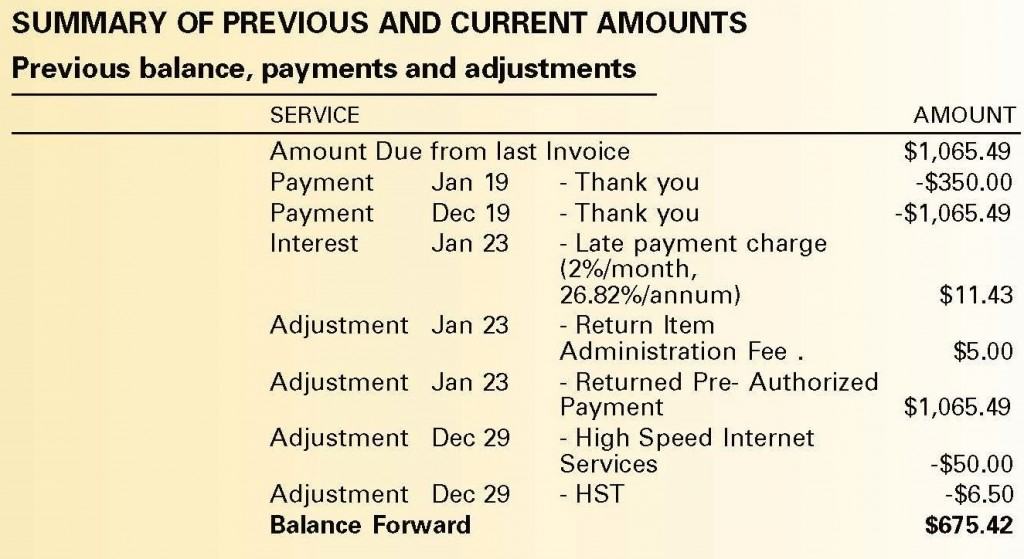 A Burlington, Ontario customer of Cogeco Cable, convinced by the company to upgrade his broadband service to a usage plan with a higher allowance, has been billed nearly $700 in broadband usage overlimit fees in a single month after the company quietly removed the cap on overlimit fees associated with the plan.
A Burlington, Ontario customer of Cogeco Cable, convinced by the company to upgrade his broadband service to a usage plan with a higher allowance, has been billed nearly $700 in broadband usage overlimit fees in a single month after the company quietly removed the cap on overlimit fees associated with the plan.
The customer first learned about the change in Cogeco’s usage-based billing policies when the company’s “auto pay” billing service deducted nearly $900 from his checking account to pay his cable bill, he told Broadband Reports.
Further charges and late fees have now racked up to almost $1,200 and so far Cogeco has only been willing to provide its customer with a $50 “courtesy credit.”
![]() Cogeco claims it notified customers last fall it was removing the maximum overlimit penalty cap from two of its broadband plans, including the one the Burlington customer was persuaded to choose by a company representative. Prior to October, The Ultimate 30 plan, designed for so-called “heavy users,” included a 125GB usage allowance with an overlimit fee of $1/GB, capped at a maximum of $50.
Cogeco claims it notified customers last fall it was removing the maximum overlimit penalty cap from two of its broadband plans, including the one the Burlington customer was persuaded to choose by a company representative. Prior to October, The Ultimate 30 plan, designed for so-called “heavy users,” included a 125GB usage allowance with an overlimit fee of $1/GB, capped at a maximum of $50.
Canadian broadband users likely to exceed a broadband usage allowance typically upgrade to a service plan with a higher allowance or factor the capped, fixed overlimit fee into their assumed monthly cost for service. But when providers like Cogeco quietly increase the maximum overlimit fee, or remove it altogether, usage-based billing shock often follows.
The customer claims he never received any change of terms notification until the first bill with unlimited overcharges arrived, and Cogeco admits it cannot assert every customer received the notification much less absorbed its meaning. According to the Burlington man, Cogeco told him customers often don’t read the letters or throw them out, unopened, assuming it is advertising.
Even if Cogeco did send a letter, the man believes the company has gone out of its way to avoid prominently alerting customers about the possibility of explosive increases in broadband usage expenses. Instead, they have framed the changes as an “enhancement” that will “help you get more from the Internet.”

When bill shock becomes an enhancement -- An informational message included on a recent Cogeco billing statement.
Cogeco customers upset about the change say it is easy for people to miss the implications buried in a rate chart that the maximum overlimit penalty has been removed.
“A Cogeco salesperson called me to change my service based on my usage,” said the Burlington man. “[The Ultimate 30 Plan] would cost me less money and in return I would receive faster internet and an increased data transfer capacity.”
Now the customer also gets hundreds of dollars in overlimit fees, too. Even worse, the man complains, he was never given an opportunity to adjust his usage or service plan to avoid the enormous bills he has since received.
“I would have stepped down to the Turbo 20 package that has a maximum of $50 for usage or the Business Ultimate 50 package which [has] unlimited data transfer,” the man complains. “Either option would have saved me hundreds of dollars.”
Cogeco’s unwillingness to forgive overlimit usage charges seems strange to the Burlington man because several other Cogeco plans retain a fixed limit on overlimit fees. Other Cogeco customers have begun to question the company’s logic in usage billing more generally, because hundreds of gigabytes consumed on a slightly slower usage plan would result in a bill a fraction of the cost the Burlington man now faces.
“Why does Cogeco’s bandwidth cost a ridiculous $1 per gigabyte on one plan, and considerably less on others with capped overlimit fees,” asks Stop the Cap! reader Jeff, another Cogeco customer who shared the story. “It’s a usage shell game and it’s all about the money because they won’t give a decade-long customer a break on fees they would never have charged many of their other customers. The bandwidth costs to Cogeco are the same no matter what plan you are on.”
Jeff wonders whether customer goodwill matters anymore at telecommunications companies.
“They’d rather harass this man for hundreds in phantom ‘costs’ and destroy their reputation in the process.”
The customer says he can’t even be sure the bill is correct.
“Internet usage based billing is flawed,” he says.
He points out the methodology and devices that determine the bandwidth are not certified or regulated by Measurement Canada. There is no recourse for customers to ensure the integrity and accuracy of the bandwidth measurements. Cogeco customers must rely on an ‘Internet Usage’ meter Cogeco has on the website. The meter is not always up to date and has frequent outages, customers report.
Against this backdrop, the Canadian Radio-television and Telecommunication Commission new rules governing the practice of usage-based billing are set to take effect tomorrow, Feb. 1st.
 “We are moving ahead with the implementation as planned to ensure that independent ISPs will continue to offer competitive and innovative services to Canadians,” said Leonard Katz, the CRTC’s acting chairman and vice-chairman of Telecommunications. “Some temporary adjustments have been made to ensure a smooth transition to the new billing regime and to ensure consumers are not inconvenienced.”
“We are moving ahead with the implementation as planned to ensure that independent ISPs will continue to offer competitive and innovative services to Canadians,” said Leonard Katz, the CRTC’s acting chairman and vice-chairman of Telecommunications. “Some temporary adjustments have been made to ensure a smooth transition to the new billing regime and to ensure consumers are not inconvenienced.”
As an interim measure, independent ISPs who are customers of the Bell companies will have the flexibility to either merge their business and residential Internet traffic, or keep them separate.
In November 2011, the CRTC established how large telephone and cable companies should charge independent ISPs for the use of their networks.
In turn, cable and telephone company Internet Service Providers can continue to use usage-based billing practices similar to what Cogeco uses, or switch to a combination of flat-rate and usage-based billing. But with the revenue potential Cogeco has illustrated it can earn from UBB, few large providers are anticipated to sell residential customers flat use plans.
“Caveat emptor,” says our reader Jeff.


 Subscribe
Subscribe






